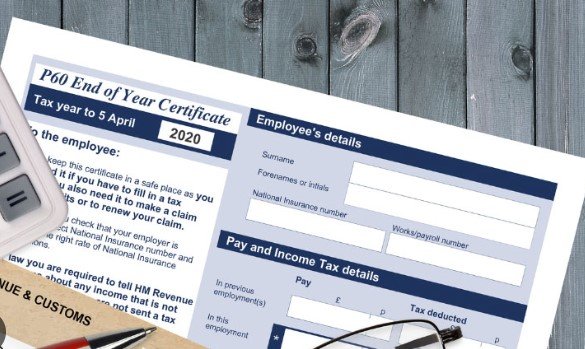Replacement Payslips and Can I Get a Copy of My P60 from HMRC?

Payslips and P60 forms are vital financial documents that play an essential role in managing personal finances. Understanding their importance, knowing how to replace them, and being aware of your rights as an employee are crucial. This article explores these aspects in detail, providing guidance on obtaining replacement payslips and securing a copy of your P60 from HMRC.
1. Introduction
Payslips and P60 forms are essential components of financial documentation that every employee should safeguard. While payslips offer a detailed breakdown of your earnings, deductions, and net pay for a specific period, the P60 summarizes your total earnings and tax paid over the fiscal year. Losing these documents can lead to complications, especially when applying for loans, verifying income, or preparing for tax filings. This article will guide you through the process of obtaining replacement payslips and acquiring a copy of your P60 from HMRC.
2. Understanding Payslips
A payslip is a document provided by your employer each time you are paid, whether weekly, biweekly, or monthly. It details your gross earnings, deductions (such as tax and National Insurance), and your net pay. Payslips are a legal requirement in the UK, and employers must provide them to employees either electronically or in paper format. The payslip serves as proof of income and is essential for financial planning, tax filings, and securing loans or mortgages.
3. The Importance of Payslips
Payslips are more than just records of payment; they are essential tools for verifying that you are being paid correctly according to your contract. They also allow you to track deductions, such as pension contributions, student loan repayments, and income tax. Moreover, payslips are often required when applying for financial products like mortgages or loans, where proof of steady income is necessary. Keeping accurate records of your payslips helps ensure you can verify your earnings and resolve any disputes that may arise with your employer or HMRC.
4. What is a P60?
A P60 is an end-of-year tax document provided by your employer. It summarizes your total earnings and deductions over the tax year, including income tax and National Insurance contributions. The P60 is issued after the end of the tax year (5 April) and is crucial for completing self-assessment tax returns, applying for tax credits, or providing proof of income to financial institutions. Understanding the differences between a P60, P45 (issued when leaving a job), and P11D (which details benefits and expenses) is important for managing your tax affairs effectively.
5. Why You Might Need Replacement Payslips
There are various reasons you might need replacement payslips. Common scenarios include losing the original documents, needing proof of income for a new job, or applying for a mortgage or loan. Sometimes, payslips are required to resolve disputes about pay discrepancies with your employer. Having access to replacement payslips ensures that you can provide accurate proof of earnings when required.
6. How to Obtain Replacement Payslips
If you need replacement payslips, the first step is to contact your employer’s HR or payroll department. Most employers can reissue payslips either in paper format or electronically. If your employer uses payroll software or an employee portal, you may be able to access your payslips directly online. It’s important to know that employers are legally obligated to provide you with payslips, even if you no longer work for them, though there might be a time limit on how long they retain these records.
7. What to Do If Your Employer Cannot Provide Replacement Payslips
In cases where your employer cannot provide replacement payslips, there are several steps you can take. First, try contacting the payroll provider directly if your employer uses an external service. If this is not possible, or if your employer is uncooperative, seeking legal advice may be necessary to ensure your rights are upheld. The UK law mandates that employees have the right to receive payslips, and failure to provide them could result in legal action against the employer.
8. Understanding the P60 Process
The P60 is issued at the end of the tax year and provides a summary of your total income and tax paid. Employers are legally required to provide you with a P60 by 31 May following the end of the tax year. If you have not received your P60, you should contact your employer immediately. Employers who fail to provide a P60 may be in breach of legal obligations, and you may need to report the issue to HMRC.
9. How to Obtain a Copy of Your P60 from HMRC
If you need a copy of your P60 and your employer cannot provide it, you can request a replacement from HMRC. This process involves contacting HMRC directly and providing your National Insurance number, employer details, and the tax year in question. HMRC can provide a statement of earnings, which serves as a replacement for a P60. The timeframe for receiving this document can vary, so it’s advisable to request it well in advance of any deadlines you may have.
10. Alternatives to Obtaining a P60
If obtaining a P60 is not possible, there are alternatives you can consider. One option is to request a statement of earnings from HMRC, which provides similar information. Another alternative is using your final payslip of the tax year, which can often serve as proof of income and tax deductions. Additionally, if you have registered for HMRC’s online services, you can access your tax details and download relevant documents from your personal tax account.
11. Legal Considerations and Employee Rights
Employees have the right to receive both payslips and a P60 from their employers. The Data Protection Act and General Data Protection Regulation (GDPR) ensure that employers must securely store and provide these documents. If an employer refuses to provide these documents, employees can seek legal advice or contact HMRC for further assistance. Understanding your rights helps protect against unlawful practices and ensures you have access to necessary financial records.
12. Frequently Asked Questions (FAQs)
- How Long Should I Keep My Payslips and P60s?
It is advisable to keep your payslips and P60s for at least six years, as HMRC can request them for tax purposes within this period. - Can I Request Replacement Payslips After Leaving a Job?
Yes, you can request replacement payslips even after leaving a job. Employers are required to provide these records for a reasonable period after employment ends. - Is There a Charge for Obtaining Replacement Payslips or a P60?
While some employers may charge a small fee for reissuing documents, many provide this service free of charge. HMRC does not charge for providing a statement of earnings as a P60 replacement. - What If I Spot an Error in My Payslip or P60?
If you notice an error, you should immediately contact your employer’s HR or payroll department to correct the mistake. Inaccuracies in these documents can affect your tax liabilities and financial records. - How Do I Obtain a P60 If I’ve Lost It?
You can request a replacement from your employer or obtain a statement of earnings from HMRC, which can serve as a P60 substitute. - Are Electronic Payslips and P60s Legally Valid?
Yes, electronic payslips and P60s are legally valid, provided they contain all required information and are accessible to the employee.
13. Common Issues and Troubleshooting
Sometimes, delays or discrepancies arise when requesting replacement payslips or P60s. These issues can often be resolved by maintaining clear communication with your employer or payroll provider. It’s important to ensure that any replacement documents accurately reflect your earnings and deductions. If errors persist, seeking legal advice or contacting HMRC may be necessary to resolve the matter.
14. How to Keep Your Payslips and P60s Safe
To avoid the hassle of replacing lost documents, it’s advisable to store your payslips and P60s securely. Consider using digital backups or online storage solutions to keep can i get a copy of my p60 from hmrc. Organizing these documents in a dedicated folder or secure location ensures easy access when needed. Regularly updating your records and backing them up digitally can prevent loss and provide peace of mind.
15. Conclusion
Payslips and P60s are critical for managing your financial health and ensuring compliance with tax obligations. Understanding how to replace these documents and knowing your legal rights as an employee are essential for financial security. By following the steps outlined in this article, you can obtain the necessary records to safeguard your financial future.






